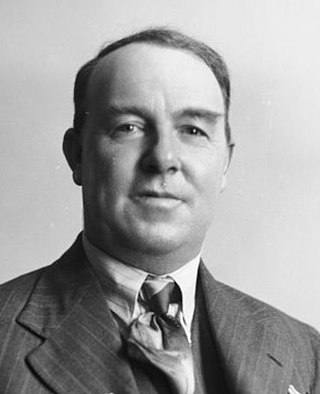
Vicki Susan Buck is a New Zealand politician. She was Mayor of Christchurch for nine years from 1989 to 1998. Prior to being Mayor, Buck was a city councillor for the Pegasus ward, having been elected as the youngest city councillor in New Zealand at the age of 19. She retired after three mayoral terms, having been very popular.

Neville George Pickering was a New Zealand politician of the Labour Party.

Arthur Ernest "Tommy" Armstrong was a New Zealand politician of Christchurch and Napier in the North Island and a member of the Labour Party. His political career, which featured many disputes and public clashes, was described as "stormy".

John Walton Beanland was a building contractor and Mayor of Christchurch from 1936 to 1938.

The Christchurch mayoral by-election in 1936 was triggered by the resignation of the incumbent, Dan Sullivan, who had been appointed cabinet minister after the Labour Party winning the general election in November 1935. The election was won by John Beanland of the Citizens' Association, who narrowly beat the Labour candidate.

The 1947 Christchurch mayoral election was part of the New Zealand local elections held that same year. In 1947, election were held for the Mayor of Christchurch plus other local government positions. The polling was conducted using the standard first-past-the-post electoral method.

The 1950 Christchurch mayoral election was part of the New Zealand local elections held that same year. In 1950, election were held for the Mayor of Christchurch plus other local government positions. The polling was conducted using the standard first-past-the-post electoral method.

The 1953 Christchurch mayoral election was part of the New Zealand local elections held that same year. In 1953, election were held for the Mayor of Christchurch plus other local government positions. The polling was conducted using the standard first-past-the-post electoral method.
The 1965 Christchurch mayoral election was part of the New Zealand local elections held that same year. In 1965, election were held for the Mayor of Christchurch plus other local government positions. The polling was conducted using the standard first-past-the-post electoral method.
The 1959 Christchurch mayoral election was part of the New Zealand local elections held that same year. In 1959, election were held for the Mayor of Christchurch plus other local government positions. The polling was conducted using the standard first-past-the-post electoral method.

The 1968 Christchurch mayoral election was part of the New Zealand local elections held that same year. In 1968, election were held for the Mayor of Christchurch plus other local government positions. The polling was conducted using the standard first-past-the-post electoral method.

The 1971 Christchurch mayoral election was part of the New Zealand local elections held that same year. In 1971, elections were held for the Mayor of Christchurch plus other local government positions. The polling was conducted using the standard first-past-the-post electoral method. The incumbent, Ron Guthrey of the Citizens' ticket, was defeated by the Labour Party candidate Neville Pickering.

The 1974 Christchurch mayoral election was part of the New Zealand local elections held that same year. In 1974, election were held for the Mayor of Christchurch plus other local government positions. The polling was conducted using the standard first-past-the-post electoral method. A significant change was the introduction of a ward system, with city councillors elected in five wards.

The 1986 Christchurch mayoral election was part of the New Zealand local elections held that same year. In 1986, election were held for the Mayor of Christchurch plus other local government positions. The polling was conducted using the standard first-past-the-post electoral method.

The 1989 Christchurch mayoral election was part of the New Zealand local elections held that same year. In 1989, election were held for the Mayor of Christchurch plus other local government positions. The polling was conducted using the standard first-past-the-post voting method.

The 1938 Christchurch City mayoral election was held on 11 May. The incumbent, John Beanland of the Citizens' Association, failed to get the nomination by his party and the surgeon Dr. John Guthrie was nominated instead. The Labour Party nominated Robert Macfarlane. Both the Labour and conservative candidate had been members of Christchurch City Council for some years. Macfarlane narrowly won the mayoralty.

The 1941 Christchurch City mayoral election was held on 17 May. The incumbent, Robert Macfarlane of the Labour Party, did not stand for re-election as he wanted to serve in WWII. Four candidates stood and Ernest Andrews of the conservative Citizens' Association was successful. Andrews was installed on 28 May 1941.
Peter Jensen Reid Skellerup was a New Zealand industrialist and philanthropist.

The 1944 Christchurch City mayoral election was held on 27 May. The incumbent was Ernest Andrews of the conservative Citizens' Association. Andrews was challenged by his predecessor, Robert Macfarlane, of the Labour Party, who had returned from active war service. Andrews won by a large majority.

William Smith MacGibbon was a New Zealand businessman and politician.











